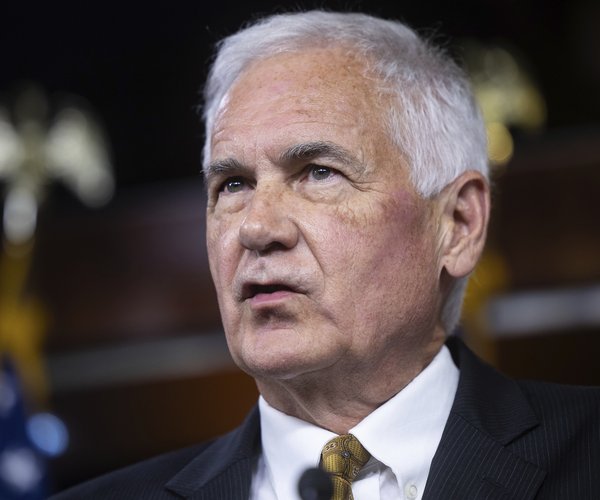Like a starting pistol, the buzzer sounded at 10 a.m. and nine robed justices entered the chamber. Chief Justice John Roberts immediately called on his colleagues to announce the court's decisions. Several hundred people listened in silence with bated breath.
Though June 24 marked my first visit to the Supreme Court, I'm passingly familiar with the institution. As a high school teacher, I explain the court's function every year. Students learn that the top body of the judicial branch interprets the Constitution and strives to provide “equal justice under law.” Personally, though, I've wondered whether the justices fully live up to these principles.
Some appear to be politicians in robes, voting more for their political interests than objectively on the law. The court's 2000 order to stop Florida's vote count and assure George W. Bush the presidency and the Citizens United case which unleashed unlimited corporate campaign spending are examples. Justices seem to respect states' rights, voter preferences, long-established laws and precedents when they suit them and ignore them otherwise. “Don't they just do whatever they want?” a student once asked me. I found it hard to disagree.
So I was eager to get a closer look at the court when an opportunity arose through Street Law, a nonprofit group that provides instruction about our legal system. During a week-long class, this outstanding program put our group of teachers face-to-face with an array of experts from attorneys to court clerks, providing insight into many aspects of the court's function. “Watch the justices' reaction during dissents,” one speaker advised us.
That proved good advice during the hearing we attended, in which the court announced greater scrutiny of affirmative action in college admissions. Justice Ruth Ginsburg disagreed with the conservative majority, and as she explained why, her colleagues exhibited behavior that a teacher might describe as adolescent. Justice Samuel Alito shook his head and rolled his eyes. Justice Clarence Thomas chewed gum, closed his eyes, put his hand to his face and exchanged whispers with Justice Antonin Scalia, who stared at the ceiling and rocked in his chair.
Clearly these justices with lifetime tenure, who are both more powerful and further beyond reproach than perhaps anyone else in the nation, do not enjoy criticism. Their main decision on the following day reinforced my impression of them as political agents.
By a 5-4 vote, the court's Republican appointees struck down the heart of the 1965 Voting Rights Act. Under the VRA, the Justice Department prevented election fraud by monitoring states and counties which repeatedly undermined voting rights. The Fifteenth Amendment to the Constitution appears to clearly permit this and Congress voted overwhelmingly to renew the act in 2006, though the law later became a target of GOP activists.
But on the last day of its session, the court took two big steps towards vindicating itself in my eyes. The justices struck down the Defense of Marriage Act, which prohibited married same-sex couples from receiving federal recognition or benefits. Providing the critical fifth vote was Justice Anthony Kennedy, who broke with typical Republican sentiments by finding that DOMA violated the constitutional promise of due process.
Similarly, Justice Roberts and Justice Scalia broke with their opposition to same sex marriage (which they expressed in dissents on the DOMA ruling) to dismiss an appeal seeking to reinstate Prop. 8, California's gay marriage ban. This upheld Judge Vaughn Walker's 2010 district court ruling that Prop. 8 violated the equal protection clause of the Fourteenth Amendment. As their decision resulted in same-sex marriages resuming in California, I credit the senior justices for voting against their apparent political desires.
Ecstasy swept the courthouse steps after the justices announced these decisions. The plaintiffs, their attorneys and hundreds of supporters celebrated with hugs, cheers, beaming smiles and tears of joy. The scene powerfully demonstrated the Supreme Court's power to right our nation's wrongs.
“Today is a great day for American children and families,” said plaintiff Kristin Perry.
“Thank you to the Constitution and thank you to the justices today who served in this court,” said plaintiff Sandy Stier.
“Thank you! Thank you!” chanted the crowd, followed by “USA! USA!”
Before the Street Law class ended, one more memorable event occurred. Our group attended a reception at the high court hosted by Justice Ginsburg. She spoke movingly about progress on women's rights during her lifetime and shared some thoughts about serving on the court. “This is the hardest and the best job I've ever had,” she said. Yet despite the disagreements between the justices, they get along and work together well, said Ginsburg, calling her institution “the finest high court in the world.”
Leaving Washington with a wealth of new information plus a few great personal memories to share in class, I decided to take her word for it.
— Matt Johanson is a freelance writer and a high school social studies teacher. His writing can be found at www.mattjohanson.com.







